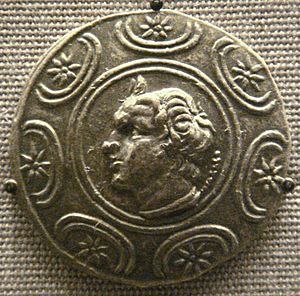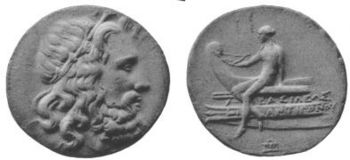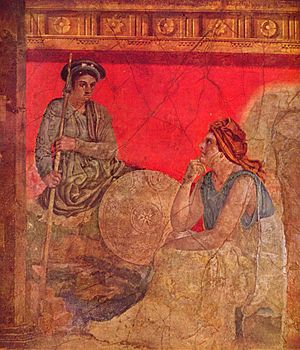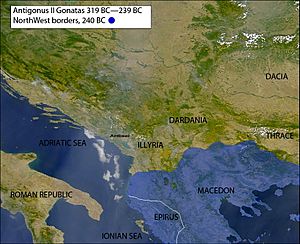Antigonus II Gonatas facts for kids
Quick facts for kids Antigonus II Gonatas |
|
|---|---|

Coin of Antigonus Gonatas
|
|
| King of Macedonia | |
| Reign | 277–274 BC (first time) |
| Predecessor | Sosthenes |
| Successor | Pyrrhus of Epirus |
| Reign | 272–239 BC (second time) |
| Predecessor | Pyrrhus of Epirus |
| Successor | Demetrius Aetolicus |
| Born | c. 320 BC |
| Died | 239 BC (aged approximately 80) |
| Spouse | Phila (daughter of Seleucus) |
| Issue | Demetrius Aetolicus |
| Dynasty | Antigonid dynasty |
| Father | Demetrius Poliorcetes |
| Mother | Phila (daughter of Antipater) |
Antigonus II Gonatas (Greek: Ἀντίγονος Γονατᾶς, Antigonos; about 320 – 239 BC) was an important Macedonian ruler. He made the Antigonid dynasty strong in Macedon after a time of great confusion. He became famous for defeating the Gauls who had invaded the Balkans.
Contents
Early Life and Family Background
Antigonus Gonatas was born around 320 BC. His nickname, Gonatas, has an unknown meaning. His family was connected to the Diadochi, who were the generals who took over parts of Alexander the Great's empire after he died.
His father was Demetrius Poliorcetes. Demetrius's father, Antigonus I Monophthalmus, controlled much of Asia. Antigonus Gonatas's mother was Phila. She was the daughter of Antipater, who ruled Macedonia and Greece. Antipater was also the regent (a temporary ruler) of Alexander's empire.
However, Antipater died in the year Antigonus Gonatas was born. This led to more fights over land and power among the Diadochi. Antigonus's grandfather and father had many ups and downs. His grandfather, Antigonus Monophthalmus, almost reunited Alexander's empire. But he was defeated and killed in the Battle of Ipsus in 301 BC. His lands were then divided among his enemies.
Antigonus as Demetrius's General
Antigonus Gonatas was 18 when his grandfather died. His future was tied to his father, Demetrius, who escaped the battle. Demetrius slowly regained some power. He took Athens and, in 294 BC, became king of Macedonia.
Antigonus's mother was from the family of Antipater and Cassander. This helped his father, Demetrius, gain support from people who had followed those former kings.
In 292 BC, Demetrius was fighting in Boeotia. He heard that Lysimachus, a ruler and enemy, was captured. Demetrius left Antigonus in charge in Boeotia and went north. While he was away, the Boeotians rebelled. Antigonus defeated them and trapped them in Thebes.
Demetrius returned and joined the siege. The Thebans fought hard. Demetrius often made his soldiers attack, even if it meant many deaths. Antigonus once asked his father why they were losing so many men. Demetrius replied, "We don't have to find rations for the dead." Demetrius was also wounded during the siege.
In 291 BC, Demetrius finally captured Thebes. But he wanted more than just Macedonia and Greece. He dreamed of bringing back Alexander's empire. He began building a huge fleet of 500 ships.
Other kings, like Seleucus, Ptolemy, Lysimachus, and Pyrrhus, were worried. They formed an alliance. In 288 BC, Ptolemy's fleet arrived in Greece, causing cities to rebel. Lysimachus attacked Macedonia from the east, and Pyrrhus from the west. Demetrius left Antigonus in charge of Greece and rushed to Macedonia.
The Macedonians were tired of Demetrius's expensive lifestyle and pride. In 287 BC, Pyrrhus took the city of Beroea. Demetrius's army left him and joined Pyrrhus, who was admired for his bravery. Antigonus's mother, Phila, took poison. Athens also rebelled. Demetrius went to besiege Athens. But he soon left Antigonus to handle the war in Greece. Demetrius took his ships and army to attack lands belonging to Lysimachus in Asia Minor.
While Demetrius was chased by armies in Asia Minor, Antigonus succeeded in Greece. He drove off Ptolemy's fleet, and Athens surrendered.
A Time of Uncertainty

In 285 BC, Demetrius surrendered to Seleucus. Demetrius told his son and commanders to consider him dead. Macedonia was divided between Pyrrhus and Lysimachus. But they soon fought, and Lysimachus drove Pyrrhus out, taking the whole kingdom.
Antigonus showed great loyalty to his father. He offered to give up his lands and become a hostage for his father's freedom, but it didn't work. In 283 BC, Demetrius died in Syria. When Antigonus heard his father's body was being brought back, he sailed to meet the ships. He brought his father's remains to Corinth with a grand ceremony. The remains were buried in the town of Demetrias, which his father had founded.
In 282 BC, Seleucus fought Lysimachus. The next year, Seleucus defeated and killed Lysimachus. Seleucus then went to Europe to claim Thrace and Macedonia. But Ptolemy Keraunos, Ptolemy's son, murdered Seleucus and took the Macedonian throne. Antigonus tried to reclaim his father's kingdom, but Ptolemy Keraunos defeated his army.
Ptolemy's rule didn't last long. In 279 BC, a large group of Gauls led by Brennus invaded Macedonia from the north. They crushed Ptolemy's army and killed him. This led to two years of chaos in Macedonia. After looting Macedonia, the Gauls moved south into Greece. Antigonus helped defend Greece. The Aetolians played a big part in defeating the Gauls. In 278 BC, a Greek army stopped the Gauls at Thermopylae and Delphi, forcing them to retreat.
The next year (277 BC), Antigonus sailed to the Hellespont. He landed near Lysimachia. When a Gaulish army appeared, Antigonus set a trap. He left his camp and hid his men. The Gauls looted the camp. When they attacked his ships, Antigonus's army appeared, trapping them against the sea. Antigonus won the Battle of Lysimachia and became king of Macedonia. Around this time, his wife, Phila, gave birth to their son and future king, Demetrius II Aetolicus.
Antigonus Becomes King
Battles with Pyrrhus
Pyrrhus, the king of Epirus, was a very skilled general. He was known for his bravery, but he often chased after impossible dreams. Antigonus compared him to a dice player who had great throws but didn't know how to use them. While Pyrrhus was fighting wars in Italy and Africa, Antigonus became king of Macedonia. Pyrrhus asked Antigonus for troops and money, but Antigonus refused. In 275 BC, Pyrrhus fought the Romans in the Battle of Beneventum. Pyrrhus decided to end his campaigns in Italy and return to Epirus.
Pyrrhus's return was bad news for Antigonus. Pyrrhus came back with an army and needed money to pay them. So, he invaded Macedonia to get plunder. His campaign went better than expected. He took several towns, and many soldiers joined him. He attacked Antigonus's army in a narrow pass and defeated them at the Aous River. Antigonus's Macedonian troops retreated. Pyrrhus then convinced many of Antigonus's soldiers to switch sides. Antigonus escaped by hiding who he was. Pyrrhus took control of upper Macedonia and Thessaly, while Antigonus held only the coastal towns.
But Pyrrhus made a mistake. He took Aegae, the old capital of Macedonia. He left Gaulish soldiers there, who angered the Macedonians by digging up royal tombs to find gold. Pyrrhus also didn't finish off Antigonus, leaving him in control of the coastal cities.
Before this campaign ended, Pyrrhus started a new one. In 272 BC, he was invited to invade Laconia (Sparta). He gathered a large army and crossed into the Peloponnese. Antigonus, who had regained some control in Macedonia, sailed to Greece to stop him. Pyrrhus besieged Sparta, hoping to take it easily. But the Spartans fought bravely. Antigonus's commander, Aminias, brought mercenaries to help. The Spartan king, Areus, also returned with 2,000 men. Pyrrhus, losing soldiers, stopped the attack and began looting the countryside.
The city of Argos was also important. Two leaders there were rivals. One, Aristippus, was Antigonus's ally. The other, Aristeas, invited Pyrrhus to Argos. Antigonus marched his army to Argos and took a strong position. Pyrrhus challenged Antigonus to fight on the plain. Antigonus replied that he would choose his own time to fight.
The people of Argos asked both kings to leave their city neutral. Both agreed, but Antigonus gained their trust by giving his son as a hostage. Pyrrhus, however, secretly planned to take the city. In the middle of the night, he entered through a gate opened by Aristeas. His Gaulish troops took the market. But his elephants had trouble getting through the small gates. This gave the Argives time to fight back. They asked Antigonus for help.
When Antigonus heard of Pyrrhus's trick, he sent troops into the city. Spartan forces also arrived. Pyrrhus's army became confused in the narrow streets. By daylight, Pyrrhus saw how strong the resistance was and decided to retreat. His army became even more confused trying to leave the city. In the chaos, Pyrrhus was hit by a tile thrown by an old woman and killed by one of Antigonus's soldiers.
Antigonus's son, Alcyoneus, brought Pyrrhus's head to his father. Antigonus was angry and upset. He cried, remembering the sad fates of his own grandfather and father. He then had Pyrrhus's body cremated with great respect.
After Pyrrhus's death, his army surrendered to Antigonus, making Antigonus much stronger. Antigonus treated Pyrrhus's son, Helenus, with kindness and sent him back to Epirus.
Later, Alexander II, Pyrrhus's son, tried to conquer Macedonia. But Antigonus's son, Demetrius, drove him out of Macedonia and Epirus. Alexander eventually returned to Epirus. His wife, Olympias, wanted good relations with Macedonia. So, her daughter, Phthia, married Antigonus's son, Demetrius.
The Chremonidean War
With his lands back and allies in Sparta and Argos, Antigonus controlled Macedonia and Greece. He was careful to keep his power. He knew Greeks loved freedom, so he allowed some freedom as long as it didn't threaten his rule. He often controlled Greek cities through local rulers, called tyrants.
Antigonus had good relations with Antiochus, the ruler of the Seleucid Empire in Asia. This alliance worried Ptolemaic Egypt. In Greece, Athens and Sparta, once powerful, didn't like Antigonus's control. In 267 BC, probably encouraged by Egypt, an Athenian named Chremonides convinced Athens and Sparta to declare war on Antigonus. This was called the Chremonidean War.
Antigonus attacked Athens by land and sea. He also destroyed a temple near Attica. To help Athens, Ptolemy II Philadelphus, the king of Egypt, sent a fleet. The Egyptian admiral, Patroclus, set up a naval base on a small island.
The Seleucid Empire had a peace treaty with Egypt. But Antiochus's son-in-law, Magas, king of Cyrene, convinced Antiochus to attack Egypt. Ptolemy sent pirates to raid Antiochus's lands. Ptolemy's army defended Egypt, but he couldn't save Athens from Antigonus. Around 262 BC, Athens and Sparta made peace with Antigonus. He kept his control over Greece.
Ptolemy II continued to get involved in Greek affairs, leading to another war in 261 BC. After two years, Antiochus II Theos, the new Seleucid king, made a deal with Antigonus. This started the Second Syrian War. Egypt lost land to the Seleucids. In 255 BC, Ptolemy made peace, giving up lands and confirming Antigonus's power in Greece.
Two years later, Egypt interfered again. They encouraged Alexander, the Macedonian governor of Corinth, to rebel against Antigonus. Alexander's revolt was a serious threat. Antigonus's military efforts failed, so he likely poisoned Alexander in 247 BC. Antigonus then married Alexander's widow, Nicaea, to his son Demetrius. This helped him regain control of Corinth in 245/44 BC.
Antigonus and Aratus
Antigonus had dealt with outside threats. Now, the main danger was the Greek love for freedom. In 251 BC, Aratus, a young nobleman from Sicyon, removed the city's ruler, Nicocles, who was supported by Antigonus. Aratus freed the people and brought back those who had been exiled. This caused some confusion in the city. To protect Sicyon from Antigonus, Aratus had the city join the Achaean League, a group of small towns in the Peloponnese.
Antigonus tried to win Aratus over with gifts. He sent Aratus 25 talents (a large sum of money). But Aratus gave the money to his fellow citizens. With this money and more from Ptolemy II, Aratus united Sicyon.
Antigonus was worried about Aratus's growing power. He decided to either win Aratus over or make Ptolemy distrust him. Antigonus praised Aratus in front of his guests, saying Aratus had realized that Egypt's power was "mere stage props." Many believed these words, and Ptolemy partly did too.
But Aratus was not Antigonus's friend. In 243 BC, Aratus launched a night attack and captured the Acrocorinth. This was a very important fort that allowed Antigonus to control the Isthmus of Corinth and the Peloponnese. When Corinth heard of this success, the people rebelled and joined the Achaean League. Aratus also took the port of Lechaeum and captured 25 of Antigonus's ships.
This defeat for Antigonus sparked a general uprising against Macedonian rule. The Megarians, Troezenians, and Epidaurians all joined the Achaean League. Aratus then invaded Athens's territory and looted Salamis. He sent any captured Athenians back without ransom to encourage them to join the rebellion. However, the Macedonians kept control of Athens and the rest of Greece.
Friends with Philosophers
Antigonus liked to have smart people and philosophers around him at his court. He is mentioned in old writings about philosophers, especially those from the Megarian, Pyrrhonist, Cynic, and Stoic schools. People said that many tried to get close to Antigonus when he visited Athens.
Many philosophers connected to Antigonus were from the Megarian school. Euphantus, a Megarian philosopher, taught King Antigonus. Antigonus also knew the Pyrrhonist philosopher Timon of Phlius. When the philosopher Bion of Borysthenes became ill, Antigonus sent servants to care for him and even visited him himself.
Antigonus became most known for his connection with the Stoics. Zeno of Citium, who started the Stoic school, was especially close to Antigonus. Antigonus would listen to Zeno's lectures in Athens and often invited him to his court. Old letters show Antigonus asking Zeno to come and guide him. Zeno was too sick to travel, so he sent two of his best students, Persaeus and Philonides, to live with Antigonus.
Once, Antigonus tested Persaeus by telling him false news that his property was ruined. When Persaeus looked upset, Antigonus said, "Do you see that wealth is not unimportant?" Persaeus became an important person at the Macedonian court. After Antigonus captured Corinth around 244 BC, he put Persaeus in charge of the city. Persaeus died in 243 BC while defending Corinth against Aratus's attack.
After Zeno died, Antigonus reportedly said, "What an audience I have lost!" Antigonus then gave money to Cleanthes, who took over as head of the Stoic school. Antigonus also attended Cleanthes' lectures. The poet Aratus, who also studied Stoicism, lived at Antigonus's court.
Connections with India
Antigonus is mentioned in the Edicts of Ashoka. These are writings from the Indian Emperor Ashoka, who sent messages about Buddhist teachings to different rulers, including Antigonus.
Death and Legacy
In 239 BC, Antigonus died at about 80 years old. He left his kingdom to his son, Demetrius II. Antigonus was not a great military hero, except for his victory over the Gauls. His main strengths were in politics. He preferred to use cleverness, patience, and determination to reach his goals. While other leaders like his father and Pyrrhus aimed higher and fell harder, Antigonus achieved stability. People also said he earned the love of his people by being honest and supporting the arts. He did this by inviting famous writers, philosophers, poets, and historians to his court. A tomb in Vergina might be his.
See also
 In Spanish: Antígono II Gónatas para niños
In Spanish: Antígono II Gónatas para niños



